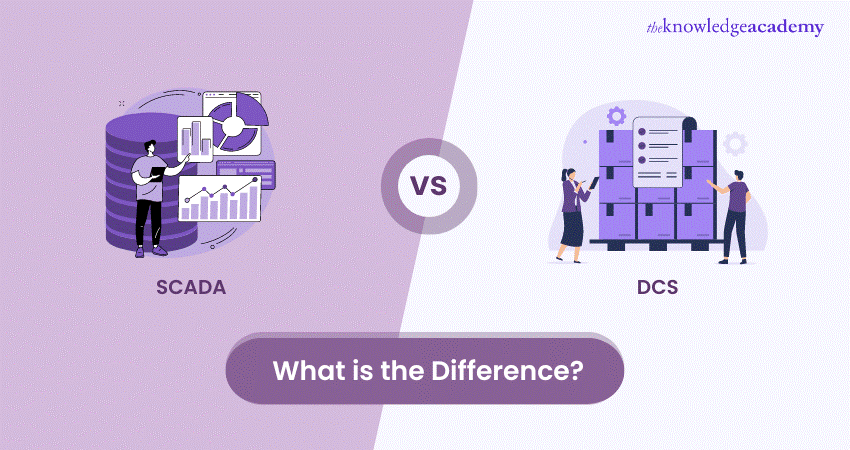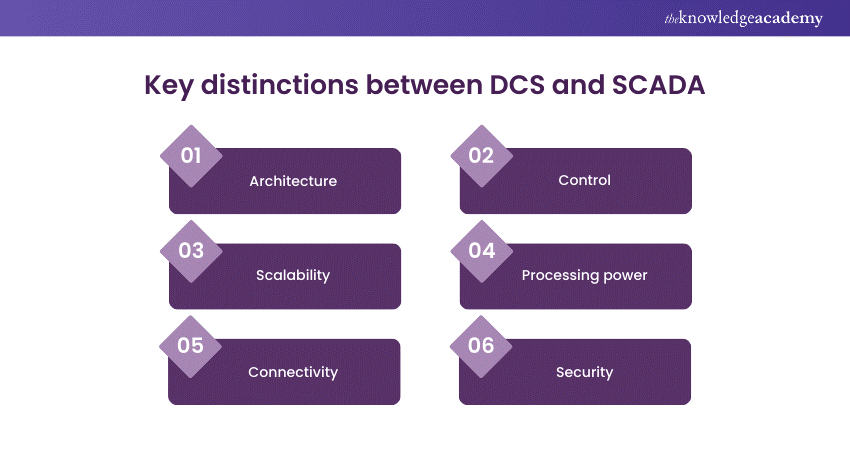We may not have the course you’re looking for. If you enquire or give us a call on 0800 446148 and speak to our training experts, we may still be able to help with your training requirements.
Training Outcomes Within Your Budget!
We ensure quality, budget-alignment, and timely delivery by our expert instructors.

Two prominent industrial automation and control systems technologies stand out: DCS, or Distributed Control System, and SCADA, or Supervisory Control and Data Acquisition. While both serve similar purposes, SCADA vs DCS has distinct characteristics catering to different industrial needs. Let's investigate the difference between DCS and SCADA to understand their nuances and compare their functionalities.
Table of Contents
1) What is DCS?
2) What is SCADA?
3) Key distinctions between DCS and SCADA
a) Architecture
b) Control
c) Scalability
d) Processing Power
e) Connectivity
f) Security
4) Conclusion
What is DCS?
A Distributed Control System (DCS) is a comprehensive control system used primarily in process industries such as oil and gas, chemical manufacturing, and power generation. DCSs are designed to manage complex processes across various geographical locations within a facility. They consist of multiple controllers distributed throughout the plant, each responsible for specific tasks or areas. These controllers communicate with each other and central servers to coordinate and regulate the entire industrial process seamlessly.
What is SCADA?
On the other hand, SCADA or Supervisory Control and Data Acquisition, focuses on monitoring and controlling industrial processes and infrastructure. SCADA systems are commonly used in water treatment, transportation, and telecommunications industries. Unlike DCS, SCADA systems typically have a centralised architecture where a single master station gathers data from remote terminal units (RTUs) or programmable logic controllers (PLCs) at different sites. The master station then processes this data, providing operators with real-time insights and control over the monitored processes.
Learn how to become a Barista with our Basic Barista Course – Sign up today!
Key distinctions between DCS and SCADA
Explore the core disparities between Distributed Control Systems or DCS and Supervisory Control and Data Acquisition or SCADA systems, shedding light on their architectural, operational, and functional disparities.

1) Architecture
One of the primary distinctions between DCS and SCADA lies in their architecture. DCSs feature a distributed architecture with multiple controllers distributed throughout the facility. This decentralised approach enables DCSs to handle complex processes efficiently, ensuring redundancy and fault tolerance.
On the other hand, SCADA systems typically adopt a centralised architecture, where a single master station oversees multiple remote sites. While this centralised structure simplifies management and reduces hardware costs, it may pose challenges in scalability and resilience for larger systems.
2) Control
DCSs excel in providing precise control over industrial processes due to their distributed nature. Each controller in a DCS is dedicated to specific tasks, allowing for localised control and rapid response to changes in process variables.
In contrast, SCADA systems offer supervisory control capabilities, enabling operators to monitor and adjust processes remotely. While SCADA systems lack the fine-grained control of DCSs, they offer flexibility and scalability, making them suitable for applications where remote monitoring and intervention are essential.
3) Scalability
Scalability is another crucial factor that sets DCS and SCADA apart. DCSs are well-suited for large-scale industrial facilities with intricate processes that require extensive control and automation. With their distributed architecture, DCSs can seamlessly scale to accommodate growing operations without sacrificing performance or reliability.
While capable of effectively managing smaller to medium-sized operations, SCADA systems may need to be improved when deployed in larger, more complex environments. However, advancements in SCADA technology have increased scalability and interoperability, bridging the gap between DCS and SCADA systems.
4) Processing power
Regarding processing power, DCSs typically boast robust computing capabilities distributed across multiple controllers. This distributed computing architecture enables DCSs to efficiently handle complex control algorithms and real-time data processing.
In contrast, SCADA systems rely on a centralised master station for data processing and analysis. While modern SCADA systems leverage powerful computing resources, they may need to improve in processing-intensive applications compared to DCSs.
5) Connectivity
Connectivity is a critical aspect of both DCS and SCADA systems, albeit with different approaches. DCSs prioritise seamless communication and integration among distributed controllers to ensure coordinated operation and data exchange. These systems often utilise proprietary communication protocols optimised for reliability and speed.
On the other hand, SCADA systems emphasise interoperability and compatibility with various devices and protocols. SCADA protocols such as Modbus, DNP3, and OPC facilitate communication with diverse industrial equipment, enhancing flexibility and integration capabilities.
6) Security
Security is paramount in industrial control systems to safeguard against cyber threats and ensure operational integrity. DCSs and SCADA systems employ various security measures to protect against unauthorised access, cyber threats, data breaches, and system disruptions.
DCSs typically implement robust security features at both the hardware and software levels, leveraging encryption, authentication, and access control mechanisms. SCADA systems also incorporate security protocols and best practices to mitigate risks, although they may face additional challenges due to their centralised architecture and broader attack surface.
Improve your Facilitation skills with our Facilitation Skills Training – Sign up today!
Conclusion
While DCS and SCADA systems share common objectives of enhancing industrial automation and control, they exhibit distinct characteristics tailored to different operational requirements. DCSs excel in providing distributed control and scalability for complex process industries, whereas SCADA systems offer centralised monitoring and flexibility for diverse applications. Understanding the differences between SCADA vs DCS is essential for selecting the most suitable solution to optimise industrial processes and ensure operational efficiency.
Learn more about the intricacies of SCADA with our SCADA Training – Join today!
Frequently Asked Questions

Yes, DCS and SCADA can complement each other in integrated solutions. While traditionally distinct, modern systems leverage interoperability protocols, allowing seamless collaboration for comprehensive industrial automation, combining the strengths of both technologies.

DCS is not inherently faster than SCADA. Speed depends on various factors, such as system architecture, processing power, and network infrastructure. While DCS may offer real-time control in localised environments, SCADA's centralised monitoring can provide rapid data acquisition and analysis across distributed systems.

The Knowledge Academy takes global learning to new heights, offering over 30,000 online courses across 490+ locations in 220 countries. This expansive reach ensures accessibility and convenience for learners worldwide.
Alongside our diverse Online Course Catalogue, encompassing 17 major categories, we go the extra mile by providing a plethora of free educational Online Resources like News updates, Blogs, videos, webinars, and interview questions. Tailoring learning experiences further, professionals can maximise value with customisable Course Bundles of TKA.

The Knowledge Academy’s Knowledge Pass, a prepaid voucher, adds another layer of flexibility, allowing course bookings over a 12-month period. Join us on a journey where education knows no bounds.

The Knowledge Academy offers various Industry Training including Basic Barista Training, SCADA Training, and Import and Export Masterclass. These courses cater to different skill levels, providing comprehensive insights into the Product Lifecycle.
Our Business Skills Blogs covers a range of topics related to online Businesses, offering valuable resources, best practices, and industry insights. Whether you are a beginner or looking to advance your Business skills, The Knowledge Academy's diverse courses and informative blogs have you covered.
Upcoming Business Skills Resources Batches & Dates
Date
 Supervisor Training
Supervisor Training
Fri 17th Jan 2025
Fri 24th Jan 2025
Fri 7th Mar 2025
Fri 21st Mar 2025
Fri 2nd May 2025
Fri 23rd May 2025
Fri 27th Jun 2025
Fri 18th Jul 2025
Fri 29th Aug 2025
Fri 12th Sep 2025
Fri 3rd Oct 2025
Fri 14th Nov 2025
Fri 5th Dec 2025
Fri 12th Dec 2025







 Top Rated Course
Top Rated Course



 If you wish to make any changes to your course, please
If you wish to make any changes to your course, please


